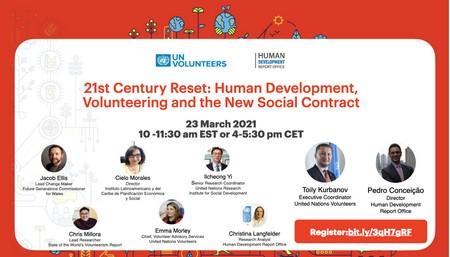
23 Mar 2021, 16:00, 8.45 pm Kathmandu time
Register here: Webinar Registration - Zoom
On You tube here: Online Dialogue: 21st Century Reset: Human Development, Volunteering and the New Social Contract - YouTube
UNDP Human Development Report Office and United Nations Volunteers
Duration
90 minutes
Summary
Charting a bold new path to development where people and planet prosper requires a reset in our ways of working and collaborating. What would a new social contract between citizens and states that secures rights and dignity for all while protecting the environment look like, and what is the role of volunteerism?
This online dialogue taking place on 23 March 2021 at 4pm CET will stir discussions on what aspects must be considered when designing a new social contract between citizens and states for building back a greener, more equitable world post-COVID. Building on the findings of the 2020 Human Development Report, the insights and examples gathered from this dialogue will further support the development of the 2021 State of the World’s Volunteerism Report on volunteerism and the new social contract.
Speakers:
- Toily Kurbanov, Executive Coordinator, United Nations Volunteers
- Pedro Conceição, Director, Human Development Report Office
- Mr. Chris Millora, Lead Researcher, State of the World’s Volunteerism Report
- Ms. Emma Morley, Chief, Volunteer Advisory Services, United Nations Volunteers
- Ms. Cielo Morales, Director, Instituto Latinoamericano y del Caribe de Planificación Económica y Social
- Mr. Jacob Ellis, Lead Change Maker Future Generations Commissioner for Wales
- Ms. Christina Lengfelder, Senior Research Analyst, Human Development Report Office
- Mr. Ilcheong Yi, Senior Research Coordinator United Nations Research Institute for Social Development
- Ms. Weenarin Lulitanonda, Co-founder, Thailand Clean Air
- Ms. Jahleel-AN Burao, Co-founder, Citizen Budget Tracker
- Ms. Marie Christina Kolo, Climate activist, ecofeminist and social entrepreneur
- Ms. Nada Nafez, UN Volunteer at the WHO Regional Office
- Ms. Maggie Carroll, Policy Specialist, United Nations Volunteers
- Moderated by Ms. Katrina Borromeo, Programme Specialist, United Nations Volunteers
Background
We have moved into an era where humans are firmly in the driving seat, and the impacts of COVID-19 have shown us that our collective leadership is not yet fit for purpose.
A shift is needed. We need an approach to setting that brings together diverse perspectives, bridges inequalities, and considers multiple human and planetary boundaries in our decisions. New social norms are required in order to navigate interconnected social and ecological systems and act in balance with our planet. Human agency and empowerment are critical to bridging the gap between intent and action from all members of society.
We know that all types of people are participating everywhere, every day, through volunteering to build the world that they want to see. This has been starkly visible during the global COVID-19 pandemic as volunteers respond to the needs of communities.
Yet the 2020 Global Synthesis Report on Integrating Volunteerism in the 2030 Agenda demonstrates that widespread participation has not led to broader ownership of the development agenda. Collective ownership, diverse perspectives, and effective collaboration between people and their governments to tackle the pressing issues of our time are all still lacking in most contexts.
As such, the 2021 State of the World’s Volunteerism Report on the 21st Century contract will explore emerging forms of collaboration between people and states in order to drive more equitable and sustainable norms, decisions and actions. It will document the experiences of policymakers and of communities as they work together. And it will examine under what conditions these models that build on voluntary action can help balance economic, social and environmental priorities, now and in the future.
To support the development of the SWVR2021, this online discussion will look at how to promote inclusive human development, protect the planet and provide a pathway to a new social contract between citizens and states and the role of volunteerism.










Add new comment